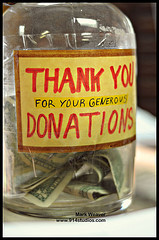Oklahoma Tornado Survivors Need Your Help, Scammers Don’t
There are no confirmed reports of fake tornado charities yet, but surely they’re coming. Scammers popped up to take advantage of the Boston Marathon bombing and the mass shooting at an elementary school in Newtown, Connecticut. How can you make sure that your money is making its way to people who need your help, and not lining the pockets of soulless swindlers?
If you’re getting a solicitation from a group you’ve never heard of, it’s best to keep your hand on your wallet. Avoid giving cash donations, which you can’t follow, trace, or cancel if you learn that there’s a scammer behind them. Do homework if you really want to give: check with the Better Business Bureau’s Wise Giving Alliance or with GuideStar.
While it isn’t exactly a scam, keep in mind that while it feels really great to gather up cast-off clothes and canned food for people in the aftermath of a disaster, someone has to transport, sort, and deal with your donations. Sending stuff can be a huge waste of everyone’s time. On the ground, it’s easiest to deal with local suppliers, and money is really easy for credible charities to move from place to place. If you feel the need to collect canned food and old clothes, hold a chili cookoff and tag sale, then send the money to an established organization like the Red Cross.
If a natural disaster has affected your home, follow the Oklahoma Attorney General’s advice for avoiding repair and cleanup contractor scams. (PDF)
$40 for a Case of Bottled Water? ‘Preying’ on Oklahoma Tornado Victims [ABC]
Storm after the storm: Consumers warned about fake Oklahoma charities [NBC News]
Want more consumer news? Visit our parent organization, Consumer Reports, for the latest on scams, recalls, and other consumer issues.


